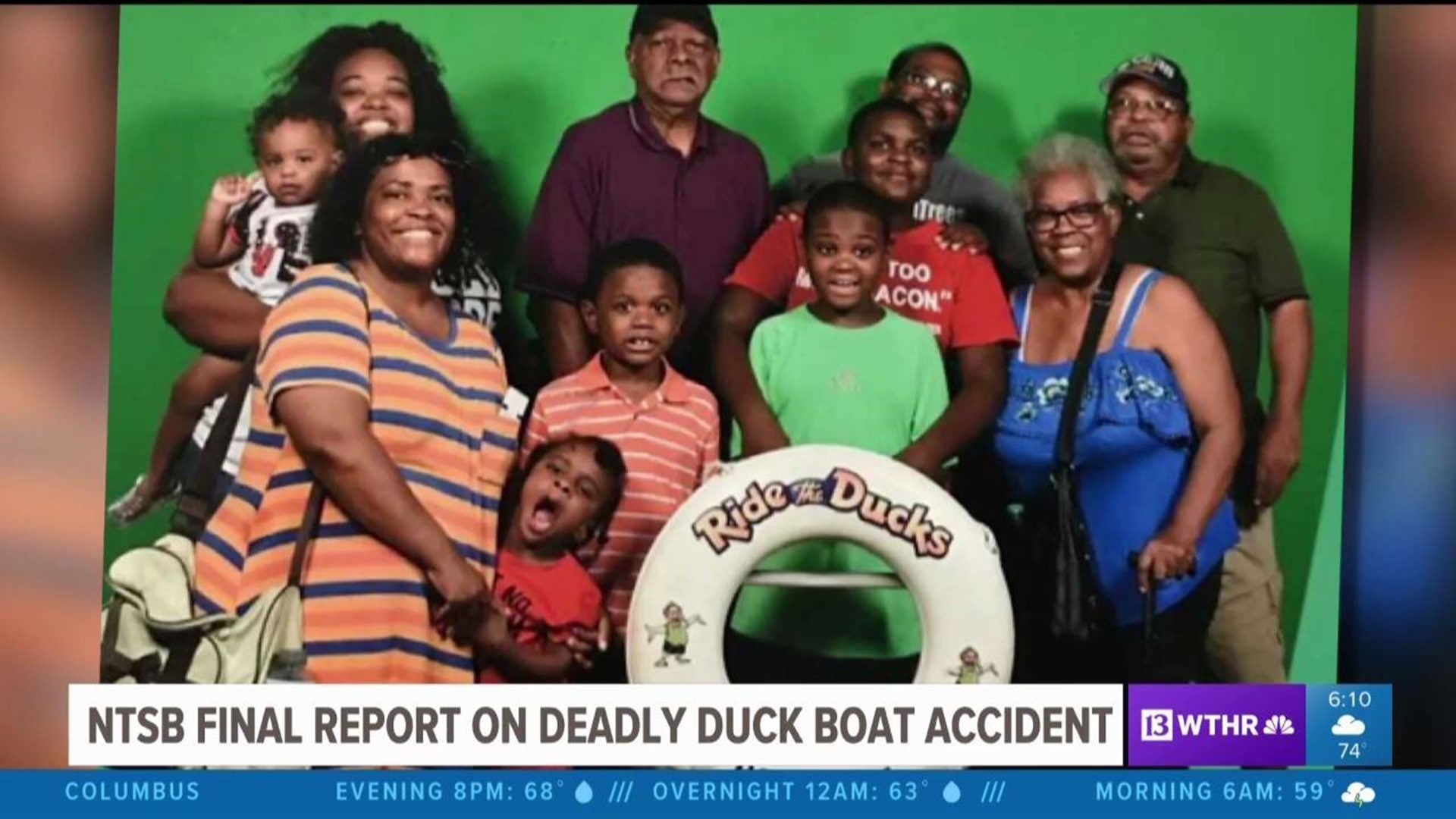LIBERTY, Mo. (WTHR) — The NTSB on Tuesday released its final report on the July 2018 duck boat tragedy in Missouri that killed 17 people, including nine members of an Indianapolis family.
The board, in a virtual meeting held online, says it blames the U.S. Coast Guard and Ripley Entertainment, Inc. for the deadly accident.
In its probable cause, the NTSB says the duck boat sank because supervisors with Ripley Entertainment still put boats on the water, even in the middle of a severe thunderstorm warning that had been forecasted and communicated to them.
Plus, the NTSB says the Coast Guard didn't force duck boats to change their design to prevent flooding, even after similar tragedies in the past. The NTSB also says so many people died in this accident, because the boats had fixed canopies and side curtains that essentially trapped passengers during an emergency.
Board members talked about how the use of life jackets onboard these vessels is a Catch-22 because while life jackets normally save more lives and may have been beneficial in some respects, when they're used with fixed canopies and curtains down, they actually force passengers downward and decrease their chance of survival.
The Coast Guard had been asked years ago to remove fixed canopies from duck boats because of their danger, but the NTSB says the Coast Guard ignored those previous recommendations.
The NTSB reiterated the need to remove canopies in a recommendation in November 2018. Now, the Coast Guard says it agrees that fixed canopies need to be removed for safety.
The NTSB also put out a list of six new safety recommendations to prevent future accidents - three for the Coast Guard and three for Ripley Entertainment, Inc.
Some of those include making duck boats more airtight and increasing operator training for recognizing and dealing with severe weather.
Recommendations to U.S. Coast Guard:
- Require that amphibious passenger vessels with forward hatches allow operators to close them while on the water to prevent water from coming into the boat.
- Review the July 2018 duck boat sinking and other similar accidents and revise navigation and boat inspection to address the issues found in these accidents including operating during severe weather and getting passengers out in an emergency where there's rapid sinking.
- Examine existing training requirements for Coast Guard credentialed masters who operate these boats and if warranted, offer additional training requirements for how to recognize severe weather before departure and while on the water.
Recommendations to Ripley Entertainment:
- Revise policies to give specific guidance on operating boats on the water during severe weather and implement a go/no go policy.
- Modify spring-loaded forward hatches on duck boats so they can close while on the water and prevent water from coming onto the boat.
- Reevaluate emergency procedures regarding life jackets on modified duck boats when they have fixed canopies.
Tia Coleman, of Indianapolis, lost her husband and three children in the 2018 sinking.
"Tia is grateful that the NTSB has studied this, has made strong recommendations," said Robert Mongeluzzi, attorney for the Coleman family. "She and we understand that they don't have the power compel the duck boat industry to effectuate these changes. But the Coast Guard does. And so she and we call upon the Coast Guard to do what you should have done 18 years ago and that is make sure that these duck boats remain afloat while flooded and if not, remove the canopies."
The attorney also maintains an earlier call to ban all duck boats for complete safety.
"Certainly if you adopt these recommendations then duck boats will be safer on the water than they are now. But they still remain lethal on land," Mongeluzzi said. "They have blind spots. They have a bow that acts as a spear in a broadside collision, which killed five people in Seattle. Blind spots killed one person in Philly and one in Boston. They weren't designed to be driven on our streets and they are death traps both on the land and on the water and should be banned."
In the wake of this tragedy, Ripley Entertainment has been hit with at least 30 legal claims, which it's settled over the past two years.

